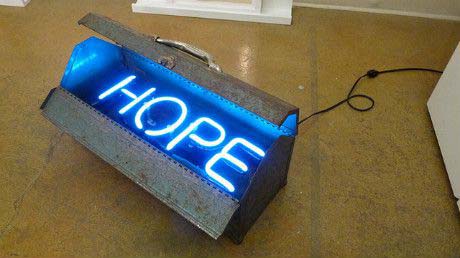4 Non-Obvious Thoughts about Hope and the New Year

It’s common to associate hope and the New Year. Yet, as 2016 dawns, we know we live in an era of huge life transitions and challenges, individually, nationally and globally.

Art by Andrew Junge – “Pandora’s Box”
Hope is a vitally important feeling state. Studies link hope to: good health; finding life meaningful ; and, all kinds of academic and athletic performance. Prof. C.R. Snyder and other researchers have shown that hopeful people value themselves more, take better care of their bodies, and have higher pain tolerance and resiliency.
Here’s four thoughts on hope and the New Year.
Hope Isn’t Just “Optimism”
At least, not in any short-term sense. Optimism tends to be about a certain result occurring, often in the short run. But hope is not dependent on short term outcomes. Hope tends to be less rational, less cut and dried. Even when it’s not immediately apparent how, hope is convinced that life will bring good things to the self.
Hope Is Not Just “Making Plans”
Certain types of psychology emphasize defining or perceiving hope in relationship to the number and type of plans for the future. Again, this would seem to be more of a measure of optimism, and to be very centred on the plans and projects of the ego. And sometimes frenetic plan-making can be indicative of the opposite of hope: despair.
Hope is about my expectation that the self will survive intact, and continue to grow and thrive, and that value and meaning will survive and thrive, also.

Hope and Trust Go Together
Depth case studies lives in the awareness that hope and trust go together. Psychological theorists have long maintained that the essential conflict in the earliest stages of life is trust vs. mistrust. This revolves at first around feeding and nutrition, and the infant getting its needs met. As the world proves predictable and responsive to the child’s needs, so the child will grow into a stance of trust. Out of this position of trust, it becomes possible for the young human to hope.
As the life journey continues the question of trust will continue, in ever more elaborate ways. As the child is loved and cared for, and is positively mirrored by the world, the sense of trust will grow, and deeper and more profound types of trust in the world, and hope for the possibilities in life will become rooted.
Love, the sense of positive valuation by others, and the sense of being seen for who he or she really is give the child the possibility of feeling real, as the psychoanalysts might say. This awareness goes hand in hand with what we can call basic trust in life, and an overall attitude of hope towards the possibilities in life.
Jung took this further. He emphasized the need to become as conscious as possible of everything that we are, of our own wholeness. By doing this, we become as aware as we can of our own reality, and, through connection to both instinct and spirit, to ultimately feel connected to the world, and like we belong in it. From a Jungian perspective, this is what ultimately grounds hope.
There’s Good and Bad Hope
Hope has an archetypal, and mythic, aspect. In the Greek myth of Pandora, she opens her box or jar, she releases all the plagues and woes that beset humankind. Only one thing remains in the bottom of the box: Elpis, the Greek daimon of hope.
Why does hope remain? Why is it in there in first place? Is hope a curse? The answer is, it can be, if it’s delusory, compulsive hope that, say, keeps one “looking for love in all the wrong places”, rather than a hope rooted in a basic trust of oneself and of the goodness of life. Helping a person get to the latter is the core business of the /a-midlife-transition.
Wishing you Happy New Year, and the fullness of good hope for 2016!
Brian Collinson, Registered Psychotherapist & Jungian Analyst
[cta]
